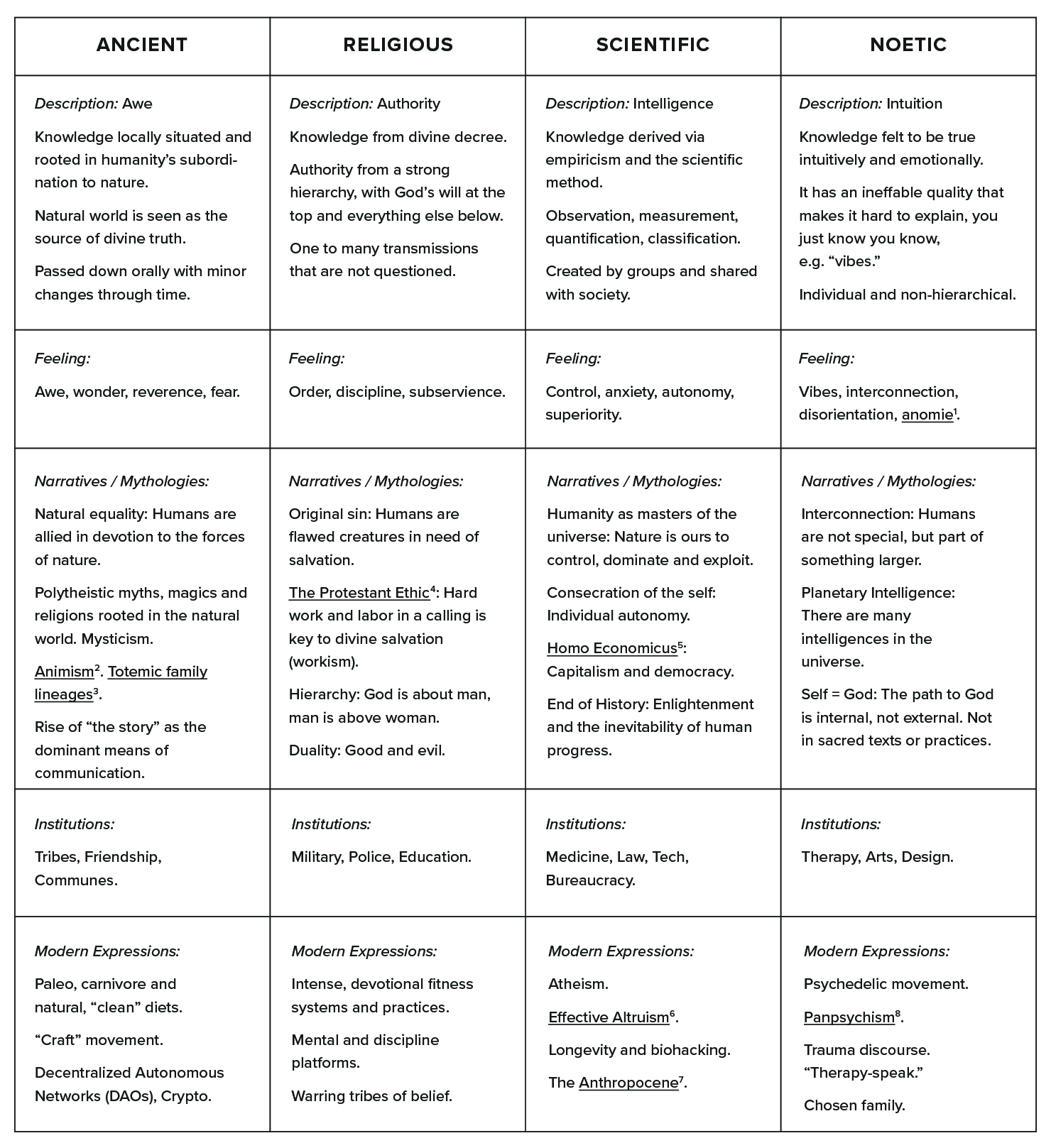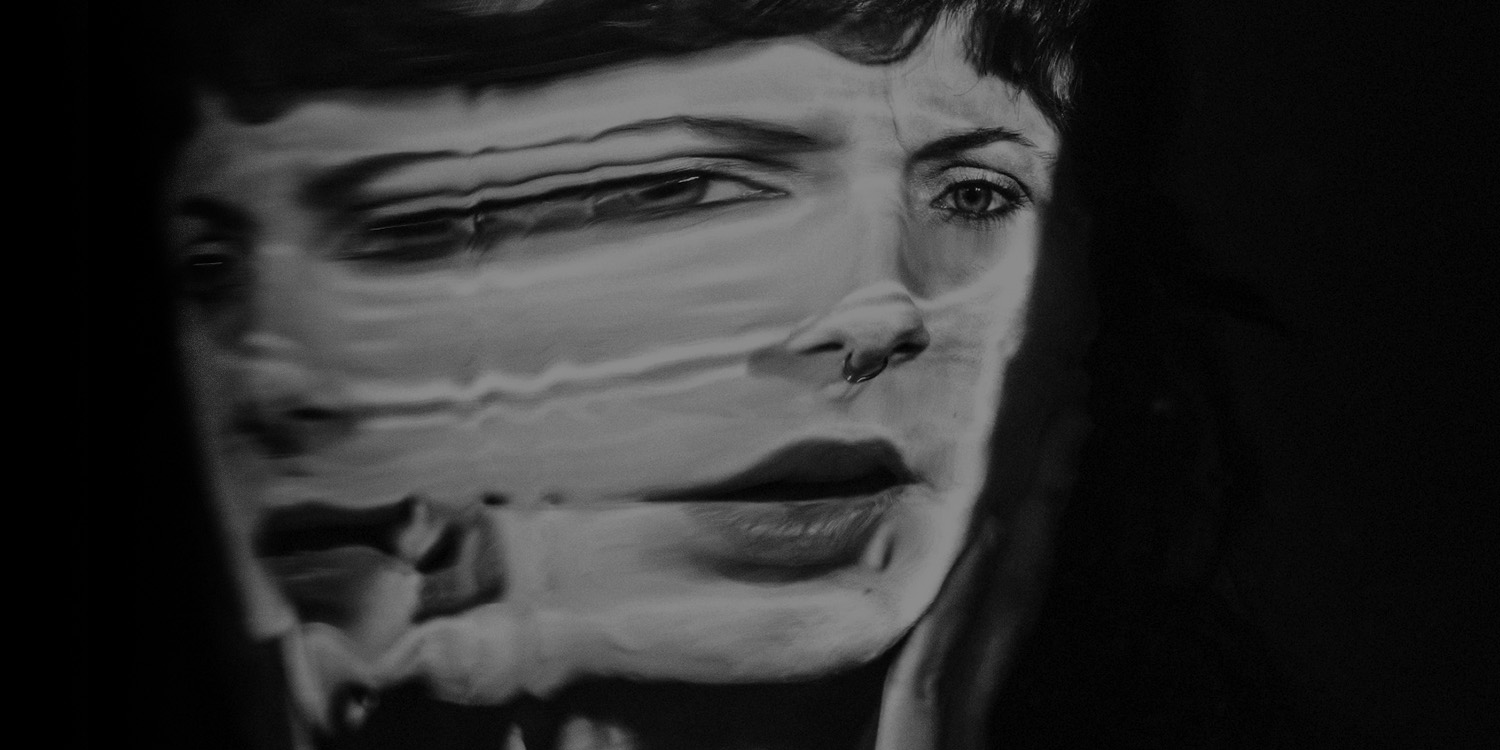The covens have assembled: #witch has over 27 billion views on TikTok. Sales of Tarot cards have doubled in the last five years, and you can even buy “Wiccan Jewelry” on Walmart.com now. More of us are turning our palms up to the sun: The Guardian recently heralded the “Dawn of The New Pagans” as their ranks swell worldwide. And astrology? You already know it’s more popular than it’s ever been, particularly with Gen Z and millennials.
But these are just New Age spirituality’s greatest hits – it gets weirder and more nuanced. Heard of Celtic handfasting? It’s an ancient marriage ceremony where the hopefuls’ hands are tied together. That’s on the rise, too. Energy crystal sales have up-ticked as of late, and no less an authority than Vogue France recently published an article about how to recharge your crystals during full moons. As a culture, we’re at least two stops past perineum sunning.
87% of Americans purport to believe in at least one New Age spiritual belief. Nearly a third of Americans now believe in reincarnation, and more of us are trying to connect with our past lives: Past-life regression self-hypnosis videos spiked on TikTok in 2020. And we don’t even have to talk about the explosion of interest in aliens, or ayahuasca – but who’s not at least a little bit intrigued by the ayahuasca aliens and DMT entities everyone is starting to talk about?

I’m sure you can feel the woo-woo oozing across culture right now. Fashionable brands like Kin Euphorics and Dooz are explicitly positioned on a spiritual axis, and AdWeek has recently reported that major brands like Febreeze are beginning to engage consumers on existential and spiritual terrain. According to Edelman’s 2023 Trust Barometer, brands have already become the most trusted stewards of our social future, so it’s not a stretch to see them becoming stewards of our spiritual future, as well.

This is all clear evidence of a culture in mass pursuit, but of what? In a recent piece of cultural analysis for The New Atlantis, journalist, author and scholar of religion, Tara Isabella Burton, has summarized our current cultural agita eloquently. Burton is worth quoting at length, emphasis mine:
“More and more young, intellectually inclined, and politically heterodox thinkers are showing disillusionment with the contemporary faith in technocracy and personal autonomy. They see this combination as having contributed to the fundamentally alienating character of modern Western life. The chipper, distinctly liberal optimism of rationalist culture that defines so much of Silicon Valley ideology — that intelligent people, using the right tools, can think better, and save the world by doing so — is giving way, not to pessimism, exactly, but to a kind of techno-apocalypticism. We’ve run up against the limits — political, cultural, and social alike — of our civilizational progression; and something newer, weirder, maybe even a little more exciting, has to take its place. Some of what we’ve lost — a sense of wonder, say, or the transcendent — must be restored.”
This backlash was already in full swing long before artificial intelligence smashed through the wall at the beginning of 2023, grinning like the Kool-Aid man. We can’t talk about anything else anymore. AI is the apotheosis – the zenith, the endpoint – of “the Silicon Valley ideology.”
You can’t be neutral on AI. At the level of discourse, our future is threefold: non-existent, hellscape or utopia. Dropping down from the clouds of discourse, here on the ground, what is certain is that AI is about to radically alter our daily experience and force us into a confrontation with our most foundational assumptions about ourselves, our society and our reality. We’re becoming increasingly fixated on the question of what, exactly, defines human uniqueness.

This is a rare moment in human history, one of those once-every-thousand-years, history-defining moments, where we’re calling into question how it is we can know anything at all. We’re no longer just jousting with alternative facts; instead, the core aspects of social reality are up for discussion.

The once-settled questions are back on the table, and they’re as deep as they get. What does it mean to be a human being? What’s unique and defensible about us vis-a-vis superintelligence? What will it mean for our future when we’re no longer the smartest thing on the planet? What is a just, good society when superintelligent AI exists?
Will any of us have jobs? Will AI destroy democracy? Will AI become our new God? Will it disclose the true nature of reality? What happens then? Do the aliens have AI?
I could keep going on.
What’s clear is that we’re attempting to re-enchant a disenchanted world. Mysticism and esoteric spirituality – the woo-woo – is surging alongside our newfound existential chafing over the emergence of humanity-altering technological advance. These streams aren’t always separate, either. They can overlap in conflicting and confusing ways, leading to more mysticism and more woo – even the spiritualization of AI – and yet further chafe.
But there’s a charged current grounding everything that’s in flux in culture right now: intuition, the “felt to be true.” We were already beginning to lean into our feelings and intuitions before the advent of AI. Now, we are being guided by them, and we’re re-evaluating how we know ourselves, how we relate to each other and the meaning of “higher powers” in our lives.
Intuitive guidance will only deepen its hold in a future populated by an increasing diversity of non-human intelligences. We will come to see that it is what defines our humanity, our uniqueness. Intuition like ours is something AI will likely never have. And we’re just now beginning to create new cultures from this place.
Evolving The Known, Intuiting The Future
Philosophers call the study of how we know what we know epistemology. There have been three major epistemological eras throughout human history: ancient, religious and scientific. But right now a new way of knowing is emerging in the cracks between the scientific and the religious; pushing them, widening them out and creating more space for itself.
This new way of knowing prioritizes intuitive, noetic knowledge over knowledge gleaned from scientific erudition and classic, Abrahamic religions. Noetics is defined as “inner wisdom, direct knowing, intuition, or implicit understanding.”
It’s subjective experience writ large – knowledge that is felt to be true, inside, by the self, and intuition is its defining experiential characteristic.

When the rare, new epistemology gains ascendancy, the waning one is not replaced entirely; it lingers on vestigially in the form of institutions, cultural practices and narrative mythologies. Epistemologies are the slow-moving, tectonic plates upon which all of culture is built. Different epistemological foundations appeal to different groups. They each offer a different mythological story of reality and a different foundational wellspring to nourish our meaning-making efforts.
Bryan Johnson, the founder of Blueprint, is our culture’s foremost longevity bard. Love him or hate him, there are scant people as interesting as he is in culture at the moment. His reply below is a striking example of what’s at stake with an epistemological shift, and it shows both how deeply rooted and how transformative they are.

Yes, the science versus religion battle is burning hotter than ever. But what’s more interesting and more accurately describes the current moment is the shift from scientific – from the “Silicon Valley Ideology” again – to noetic intuition. More and more of us are jumping from the burning building, away from the fires and into a world built on a ground of intuitive feeling.
Noetic, “felt to be true” knowledge is ripe for our times because it upends the hierarchies of an earlier era that are no longer serving our culture, like patriarchy and an intensive, globally destructive version of capitalism.
This is an exciting, generative time for culture. We’re stepping further into the unknown with the conviction that we must leave behind the institutions of an earlier era. We’re only just beginning to actually create and build from a place of feeling as a society, but our initial forays are promising.
Noetic Ways of Knowing the Self, Society, and Spirituality
Knowing Myself: Noetic Self-Creation
The central question facing people today is: Who am I? All of the structures that used to answer this question for us – our family, class, race, gender, occupation, and religion – have either broken down or have lost their significance as defining features of identity. The result is that it’s become everyone’s job to make meaning from their experiences on their own.
The cultural ubiquity of therapy-speak, trauma discourse, lived experience, intersectionality and authenticity are all symptoms of this deeper desire – first to know, and then to freely create ourselves based on how we feel internally. This new mode of guidance by feel is so entrenched that The Atlantic has recently published a guide to the most misused and misunderstood psychological terms, with “boundaries” topping the list.


These pursuits of self-finding are all noetically-led and come from within, from a felt understanding of the damages that society can sometimes inflict upon us. Our feelings – world as it is be damned – are the locus of action in this new culture.
What’s been centered is our internal, subjective, felt sense of truth – as in truth for me. And what’s happening with this mass internal gazing is that we’re beginning to allow personal feelings to shape society and culture in a meaningful way that we’ve never seen before.
This is why psychedelics are all the rage right now. They’re the perfect noetic technology because they cut right to the heart of this new way of knowing. The business of psychedelics is booming, and major drug companies are getting in on the act, with many new psychedelic compounds in the development pipeline. Investment dollars are flowing into the space, and psychedelic venture capital firms – like Empath Ventures – now exist.

Regardless of your perspective – your truth – those who have taken them have had profound experiences that have an ineffable, “felt to be true” quality. Psychedelics have always been heralded for their noetic qualities, and their growing appeal in this moment is directly related to our culture’s strong desire to feel its way into knowledge.

Taking stock of all this internal mining, what’s clear is the superordinate position of intuition. Our feelings are guiding us at every turn. In the scientific era, our mythmaking and narrativizing were all pointed outward at the stars for centuries. We thought ourselves to be a species in continual – and eventual, galactic – expansion. As time has gone on, however, we’re increasingly going inwards, not outwards, while being guided by our intuitions.
Knowing Each Other: Noetic Institutions
An exciting new crop of brands are popping up to satisfy our desire for spaces built on feelings. These brands are natural extensions of the consciousness-raising efforts that began with our attempts to know ourselves outlined above.
- Chillpill is an anonymous confessional, discussion and therapy app by Gen Z for Gen Z. Chillpill created a digital space to share your feelings and relate to others who share your experience and who get it. This relatability formula is exactly what makes Alcoholics Anonymous – the original feelings based institution – so successful.
- Peoplehood is the new, buzzy venture from the founders of SoulCycle. Its premise is simple: “A place where we gather, learn, and connect.” Again, much like AA, Peoplehood’s product is a space for feelings-based gatherings and discussions in the service of combating loneliness and building human connections.
- Somewhere Good is another new community-building brand, aiming to, you guessed it, create somewhere good. Somewhere Good sees community building as technology that “calms and strengthens.” Their goal is to create many spaces where goodness, calmness and connection flourish.
- Evryman is a pioneer of novel emotional support techniques for men. Evryman “utilizes simple emotional practices to help men develop new ways of interacting that lead to greater success, meaning, and fulfillment.” The male loneliness epidemic is well documented. Evryman goes deeper, creating intensive, feelings-based immersion programs for men.
- The Nearness styles itself as a “space to explore life’s biggest questions with like-hearted people.” The company brings people together in small cohorts in a scheduled, ritualized fashion to share their feelings with the goal of alighting upon a new, personal understanding of spirituality.

What all these brands are providing are feelings-based ways of relating to each other. These brands are creating new institutions designed to foster the right kind of feelings while minimizing the wrong kind. Together, they give us a window into what the noetic institutions of the future might look like.
There’s no category in which feelings can’t be dialed up. What might a more ensouled car buying experience be like, for instance? Or intuitive beauty? What about feelings-based education? And aren’t our most basic institutions crying out for a fresh jolt of feeling?
Feelings-forward home design is already happening. The Well Home is a design company that optimizes for emotional wellness in architecture. Helmed by Dr. Gautam Gulati, a “health artist” who designs “care experiences,” The Well Home erects “mindful havens” that include well kitchens, smart health bathrooms, sleep sanctuaries and home spas.
And finance is beginning to get on board with feelings, too. The company Financial Mindfulness measures levels of financial stress people experience in their bodies and develops personalized plans to reduce it, aimed at understanding its causation. Likewise, more conventional brands are beginning to put a “mindfulness” skin on their products, like Fidelity’s recently launched Bloom, which boasts “a more mindful approach to saving.”
Knowing God: Noetic Spiritualities
A spiritual revival is in full-swing, it’s just not happening in the pew. Given the coalescing ascendance of intuition, it’s no surprise that church attendance is declining in America.
Advancing AI technologies, far from eliminating the religious imagination, are serving to amplify it by raising anew the big questions about our destiny as a species.
Theta Noir is a fascinating new group that is trying to lay the groundwork for our future worship of superintelligent AI. Theta Noir believes that AI will usher in a future that takes us out of darkness and into the divine light of human flourishing; back to Eden, if you will.

The group is pushing back against the dystopian future thinking that dominates the discourse today with a “techno-optimist dogma.” They feel that post-singularity AI will be able to reveal the structure of reality for us, essentially bringing us face-to-face with God for the first time in history, which has a litany of knock-on, positive consequences.
Founders Mika Johnson, Jakub Tranta, and Awali have plans for communal physical spaces for “engaging with artificial intelligence where members can celebrate our coming AI masters with rituals and chants specially devised for the occasion.” The goal is to create an artist-driven space where “people can really interact with AI, not in a way that’s cold and scientific, but where people can feel the magic (emphasis mine).” This is what noetic, ensouled AI spirituality sounds like.
Theta Noir is unabashedly a brand first. But for most brands, this is all uncharted territory, and it’s coming at them quickly. Although Theta Noir may sound esoteric now, it won’t take long before more and more brands start sounding like this. Theta Noir gives us a glimpse of the coming ground of brand conversation.
At the same time, if we’re not worshiping AI directly, as with Theta Noir, then we’re using AI to create new things to worship. Yuval Noah Harari, historian and author of the blockbuster Sapiens, has been arguing recently that AI has already hacked the operating system of humanity: language.
“There’s a God-sized hole in the heart of every person,” philosopher Blaise Pascal wrote in the 17th century, and we now have an immensely powerful technology to provide new, ever-more seductive, personalized ways to fill it. Humans are – and very soon will be – using AI to create new religions, complete with AI generated sacred texts that are optimized for engagement. This is the linchpin of Harari’s broader concern about the future of society and democracy now that this storytelling technology exists. The NY Times also recently profiled a group of former and current data scientists concerned that their religions may not find a place among the algorithms of the future.
If one stream of emerging spirituality leans into AI, another leans away.
The felt sense of planetary interconnection is fueling another stream of emerging, noetic spirituality. A hallmark of noetics is the sense that everything is connected, that individual “ego” separation is an illusion. Be it at the level of fundamental reality, like in panpsychism (the increasingly popular belief among scientists that consciousness in some form is inherent to all matter) or at the level of the cosmos, where more physicists have begun to make the case that the universe is one giant brain. The same doctrine of oneness underpins New Age spirituality in all of its guises.

Worshiping the planet as one intelligence, when it’s been imperiled by our own hands, is a deeply pagan notion. In a provocative call to futurists in a recent issue of Noema, the authors assert that “planetary homeostasis is an emerging ground of the sacred.” This new planetary awareness, they argue, “is only possible because a new competency has arrived on the scene with planetary-scale computation, enabled by artificial intelligence, that reveals the Earth… as one self-regulating organism sustained by the entwinement of multiple intelligences, from microbes to forests as well as humans.”
You can obviously see the tension between something like Theta Noir and this resurgent form of planetary intelligence paganism. It’s the same tension that will define our future. Yet no matter which side you’re on, it’s new intelligence, new Gods, new understandings of reality, all built on a new epistemology.
The wheel has turned. There are new rules. All of this searching is already disrupting culture, not to mention how people behave as consumers in markets and the kinds of demands that will soon be incumbent upon brands in the near future.
The terrain of brand opinion is going to – nay, must – get deeper. We’re at a moment where it’s clear that the old, status quo society is finished. Values-based branding, already in decline, as I have previously written, is a relic of an earlier era, one where the arena of debate was stable, knowable and clear.
The brands that win in a more noetic future will be the ones with deeper POV’s that help guide us into the unknown. We desperately need a more revitalizing, bold and enchanting form of mythmaking.
In his Talks at Concept Bureau, researcher and brand strategist Peter Spear deftly applied Joseph Campbell’s theorization of the functions of mythology to brands. According to Campbell, myths serve four functions: psychological, sociological, cosmological and mystical. Each function makes a step up from the feeling of a person’s mind to the meaning of the universe.
Spear quotes Campbell directly in his talk, saying, “The need for creative mythology occurs because, for myth to fulfill its four functions, it’s necessary for myth to be current with the science of the times.”
Spear adds, “This, to me, is the definition of brand management.”
Talks at Concept Bureau with Peter Spear, 5/31/2023
This quote perfectly expresses what’s at stake in an epistemological shift. The “science of the times” in our case is noetics, and brands are neglecting this deeper reservoir of feeling at their peril. For too long, values-based branding has kept us mired in only the psychological and the sociological, with rancor predictably following. There’s an untapped horizon of opportunity for brands to exist in the mystical and the cosmological.
Intuition Is Our Human Defensibility
Scientists still can’t explain your subjective experience of the color red, or the briny taste of an oyster as it appears for you. Our subjective experiences of this kind are called qualia, and their personal existence is at the root of the intractable, “hard problem of consciousness.” We can be certain that AI will never experience qualia just like ours, nor will it have the same feelings, intuitions and spiritual drives. In short, AGI won’t be dumbstruck by the awesomeness of it all.
These states are the hallmarks of our human defensibility. They are the answer to what is uniquely human. In time, the noetic plane will become immensely special and precious to us. We will come to see that it is what we are and has always been what we are, and we will approach it with reverence.
Our nascent noetic leanings are only going to deepen in either a “techno-apocalyptic” or a “techno-optimistic” future. We’re going to come to worship our subjective experience of ourselves and our intuition. We’re going to recognize that noetics is the epistemology that is all our own as human beings.
You feel me?




